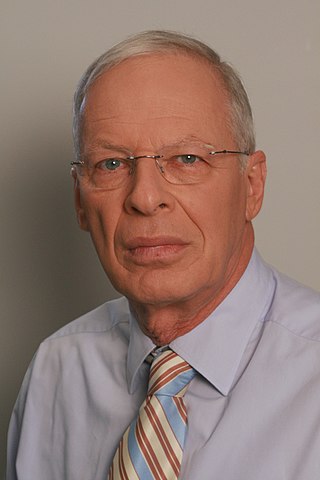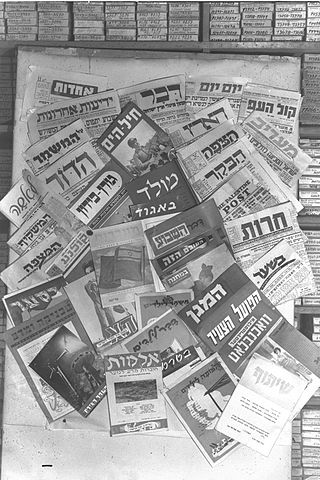
Haaretz is an Israeli newspaper. It was founded in 1918, making it the longest running newspaper currently in print in Israel. The paper is published in Hebrew and English in the Berliner format, and is also available online. In North America, it is published as a weekly newspaper, combining articles from the Friday edition with a roundup from the rest of the week. Haaretz is Israel's newspaper of record. It is known for its left-wing and liberal stances on domestic and foreign issues.

Media coverage of the Israeli–Palestinian conflict has been said, by both sides and independent observers, to be biased. This coverage includes news, academic discussion, film, and social media. These perceptions of bias, possibly exacerbated by the hostile media effect, have generated more complaints of partisan reporting than any other news topic and have led to a proliferation of media watchdog groups.
The public diplomacy of Israel is Israel's efforts to communicate directly with citizens of other nations to inform and influence their perceptions, with the aim of garnering support or tolerance for the Israeli government's strategic objectives. Historically, these efforts have evolved from being called "propaganda" by early Zionists, with Theodor Herzl advocating such activities in 1899, to the more contemporary Hebrew term "hasbara" introduced by Nahum Sokolow, which translates roughly to "explaining". This communicative strategy seeks to justify actions and is considered reactive and event-driven.

The Jerusalem Center for Public Affairs (JCPA) is an Israeli think tank specializing in public diplomacy and foreign policy founded in 1976. Describing itself on its website as "The Global Embassy for Israel", it publishes the biennial journal Jewish Political Studies Review alongside other content.

Avigdor Lieberman is a Soviet-born Israeli politician who served as Minister of Finance between 2021 and 2022, having previously served twice as Deputy Prime Minister of Israel from 2006 to 2008 and 2009 to 2012.

Yair Lapid is an Israeli politician of the centrist Yesh Atid party, and a former journalist. He has been the Leader of the Opposition since January 2023, having previously served in that role from 2020 to 2021. He served as the 14th Prime Minister of Israel from 1 July to 29 December 2022. He previously served as the Alternate Prime Minister of Israel and Minister of Foreign Affairs from 2021 to 2022. He served as Minister of Finance from 2013 to 2014. Lapid is the chairman of Yesh Atid.
The Committee for Accuracy in Middle East Reporting in America (CAMERA) is an American non-profit pro-Israel media-monitoring, research and membership organization. According to its website, CAMERA is "devoted to promoting accurate and balanced coverage of Israel and the Middle East." The group says it was founded in 1982 "to respond to The Washington Post's coverage of Israel's Lebanon incursion", and to respond to what it considers the media's "general anti-Israel bias".

The 2000 Ramallah lynching was an attack that took place early during the Second Intifada on 12 October 2000 in the Israeli-occupied West Bank, when a Palestinian crowd of passing funeral marchers broke in and killed two Israeli military reservists and then mutilated their bodies.

Martin Sean Indyk was an Australian-American diplomat and foreign relations analyst with expertise in the Middle East.

Ehud Yaari is an Israeli journalist, author, television personality and political commentator.

Daniel "Danny" Ayalon is an Israeli diplomat, columnist and politician. He served as Deputy Foreign Minister and as a member of the Knesset. He was the Israeli Ambassador to the United States from 2002 until 2006. Previously, he worked as senior foreign policy advisor to Prime Ministers Ariel Sharon, Ehud Barak, and Benjamin Netanyahu.
Chris McGreal is a reporter for The Guardian.

There are over ten different languages in the Israeli media, with Hebrew as the predominant one. Press in Arabic caters to the Arab citizens of Israel, with readers from areas including those governed by the Palestinian National Authority. During the eighties and nineties, the Israeli press underwent a process of significant change as the media gradually came to be controlled by a limited number of organizations, whereas the papers published by political parties began to disappear. Today, three large, privately owned conglomerates based in Tel Aviv dominate the mass media in Israel.
Censorship in Israel is officially carried out by the Israeli Military Censor, a unit in the Israeli government officially tasked with carrying out preventive censorship regarding the publication of information that might affect the security of Israel. The body is headed by the Israeli Chief Censor, a military official appointed by Israel's Minister of Defense, who bestows upon the Chief Censor the authority to suppress information he deems compromising from being made public in the media, such as Israel's nuclear weapons program and Israel's military operations outside its borders. On average, 2240 press articles in Israel are censored by the Israeli Military Censor each year, approximately 240 of which in full, and around 2000 partially.

Akiva Eldar is an Israeli political analyst, author and journalist.
Media played an important part of the 2008–2009 Israel–Gaza conflict. Foreign press access to Gaza has been limited since November 2008 via either Egypt or Israel. On 29 December 2008, the Israeli Supreme Court ordered that journalists be allowed into Gaza whenever the crossings were opened, but the IDF refused to comply. There have been arrests of journalists due to violations of wartime censorship in Israel, and these have been denounced by international press organizations. Media infrastructure, including Al-Aqsa TV transmission equipment and foreign and local press offices, were hit during the conflict. Media relations also played an important role, with the use of new media on the part of Israel, as well as a clear public relations campaign.

The Government Press Office is responsible for coordination between the Government of Israel and journalists and media personnel working in the country. The GPO serves as the central address for foreign press contact with the government and the Israel Defense Forces.
Al Jazeera Arabic is a flagship news channel that primarily caters to an Arabic-speaking audience. Al Jazeera English, launched in 2006, is the English-language counterpart to Al Jazeera Arabic. According to Al Jazeera, Al Jazeera Arabic is editorially independent from Al Jazeera English, although it shares the same editorial vision. It is based in Doha and operated by the Al Jazeera Media Network.

Media coverage of the 2014 Gaza War were varied depending on the media source. In the English-speaking world, U.S. news sources were often more sympathetic to Israel, while British news sources were more critical of Israel. Commentators on both sides have claimed that the media is biased either for or against Israel. According to The Times of Israel, British sources were more often critical of Israel. As the conflict progressed and Palestinian deaths increased, media became somewhat more critical of Israel.

Avi Issacharoff is an Israeli journalist, known for his focus on Palestinian affairs. He is a Middle East commentator for The Times of Israel and its sister news outlet Walla!, and the Palestinian and Arab Affairs Correspondent for Haaretz. Issacharoff is known as one of the creators of the TV-series Fauda.













